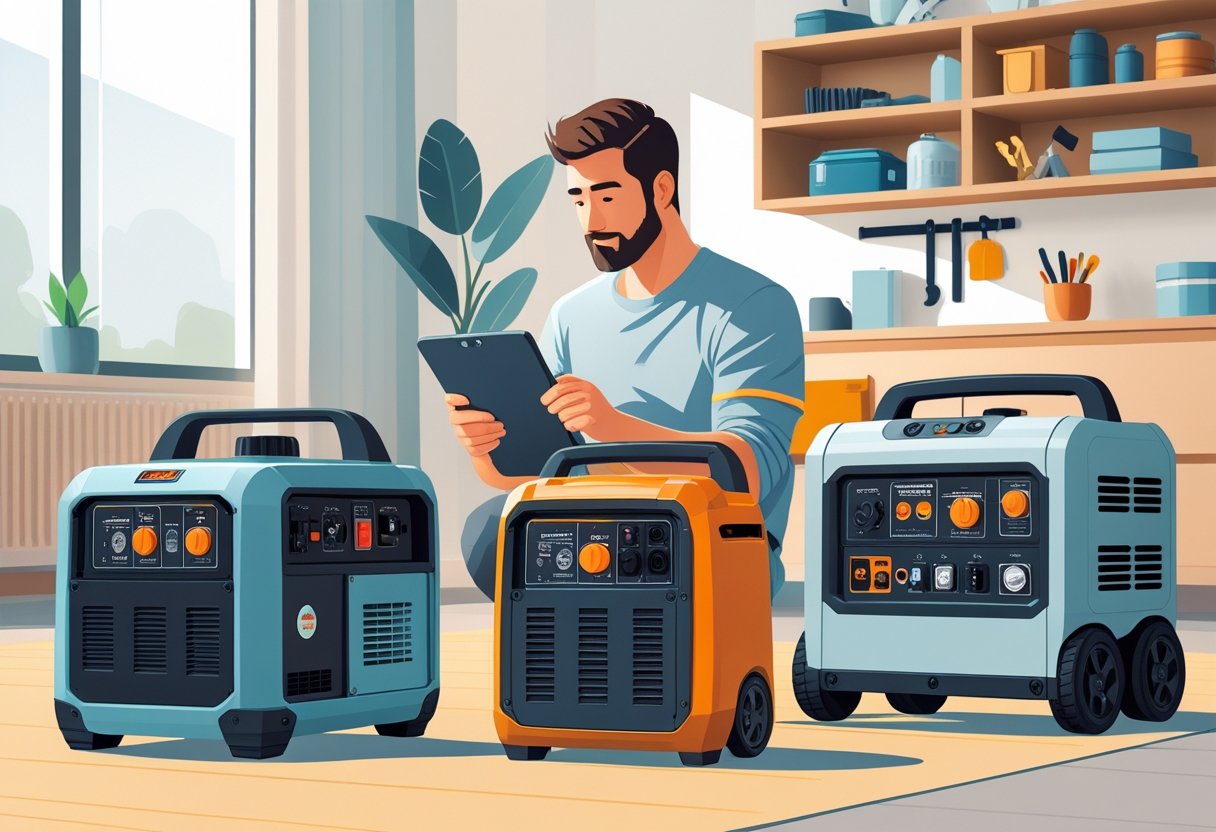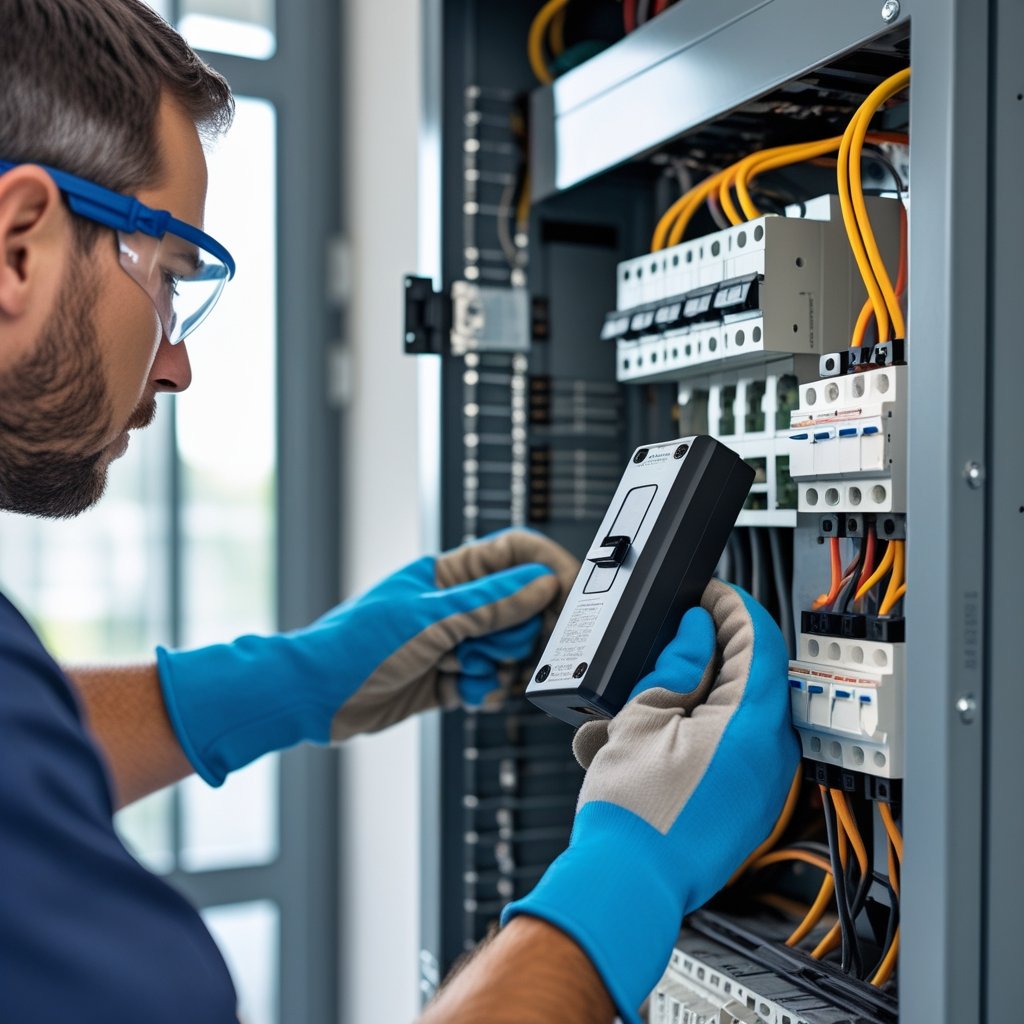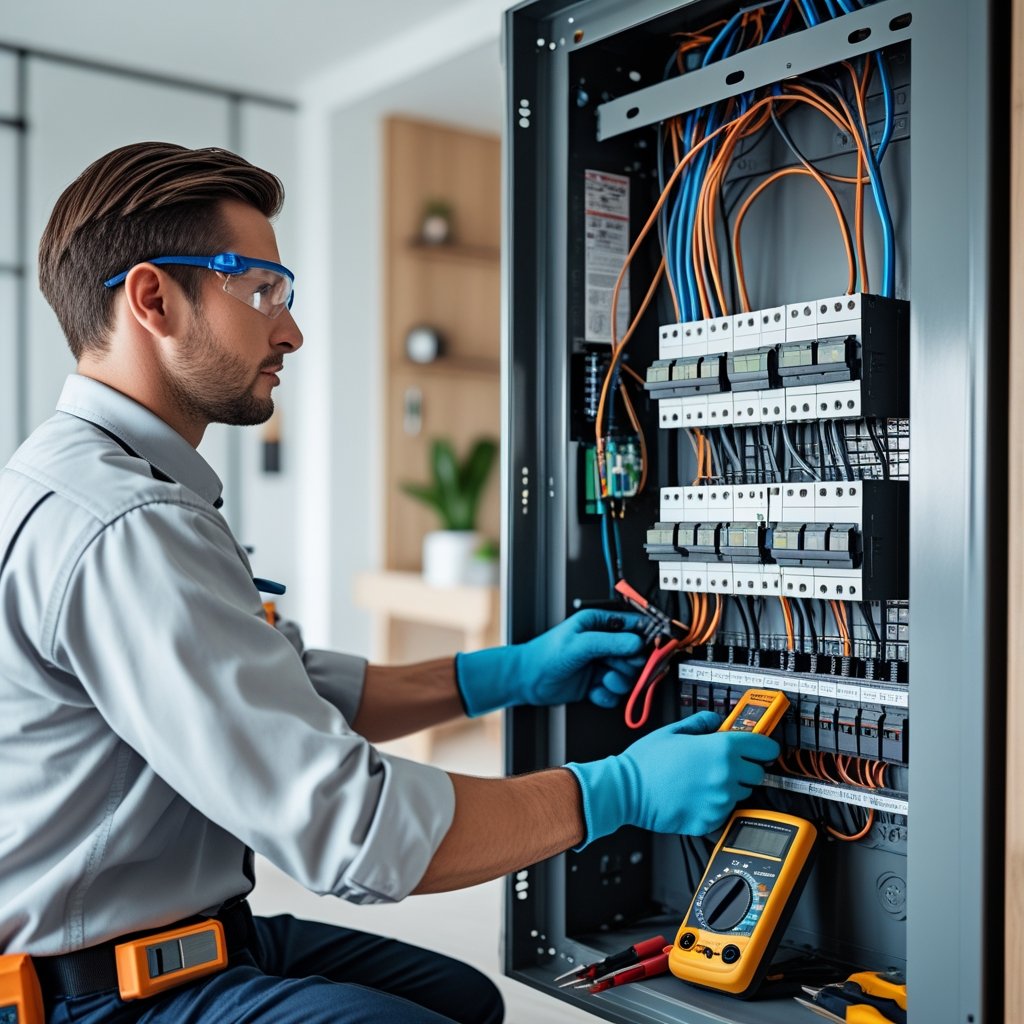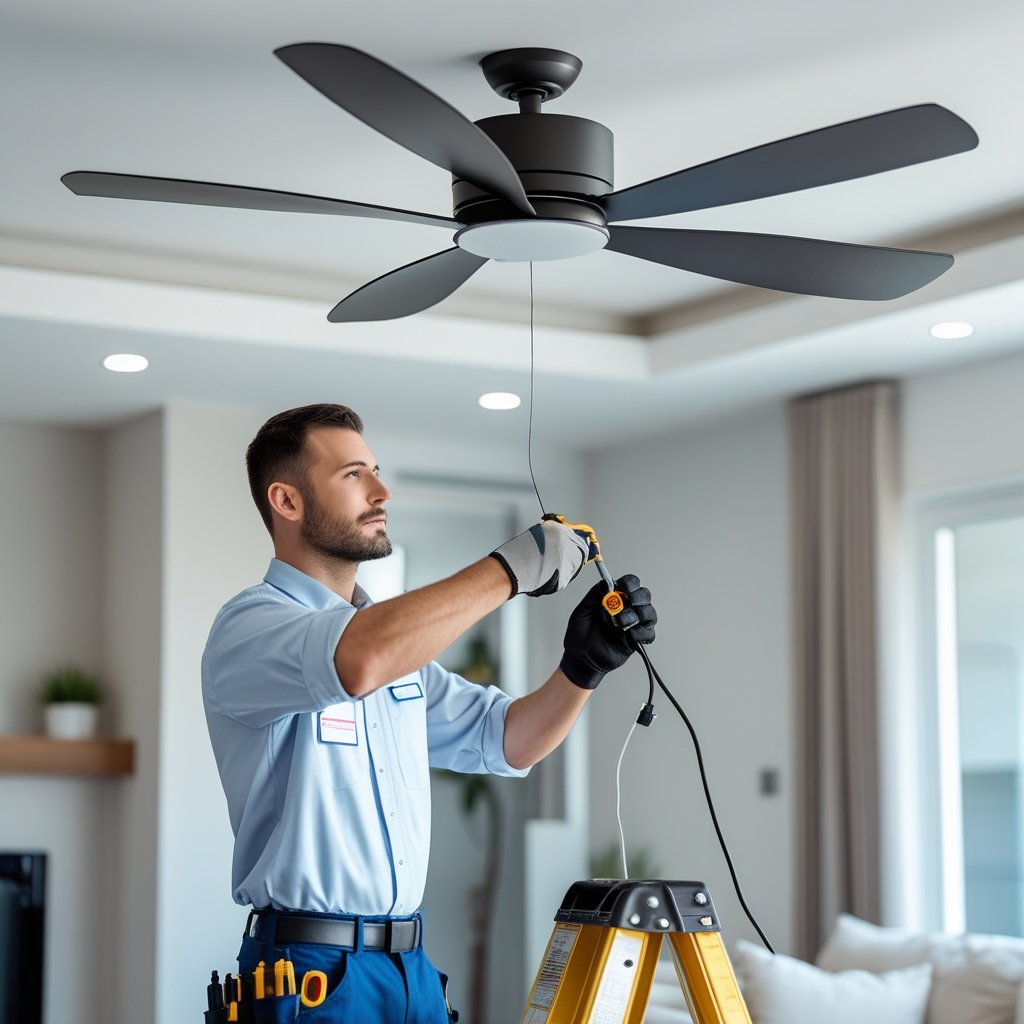Choosing the right generator for your home means finding a reliable power source tailored to your specific needs. The key is to determine the total wattage required to run your essential appliances and systems during an outage. By understanding your power needs, you can select a generator that keeps your home safe and comfortable without overspending or risking damage to your equipment.
You’ll also want to consider factors like fuel type, noise level, and whether a portable or standby generator makes the most sense for your situation. At AAA Electrical Services, we emphasize a safety-first approach, ensuring your generator installation and maintenance meet the highest standards to protect your family and home.
Serving communities around Sacramento and nearby areas, our licensed technicians provide honest, flat-rate pricing and same-day service so you can trust your home’s backup power is handled quickly and professionally.
Identifying Your Home Power Requirements
To choose the right generator for your home, you first need to understand which appliances and systems must remain functional during a power outage. Knowing your total power needs helps you avoid buying an undersized or oversized generator, saving both money and hassle.
Essential Appliances and Devices
Start by listing appliances and devices you want to power during an outage. Common essentials include:
- Refrigerator and freezer
- Heating and air conditioning systems
- Sump pumps to prevent flooding
- Medical equipment if applicable
- Lighting for key areas
- Communication devices and chargers
Focus on items critical for safety and comfort. Prioritize those that, if left off, could cause health or property risks.
Keep in mind that certain appliances, like air conditioning units and sump pumps, often require more power to start than to run continuously. This will affect your generator choice.
Calculating Wattage and Generator Size
Determine the wattage of each essential device by checking labels or using online resources. You can then total the wattages to get an estimate of your peak power demand.
Example wattage needs:
ApplianceRunning WattsStarting WattsRefrigerator7002200Sump pump8001600Air conditioner20003500Lighting (LED)300300
Add the highest starting watts in your list to the total running watts of other devices. This sum gives a safe estimate of the generator capacity you need, usually expressed in kilowatts (kW).
For exact sizing and installation questions, you can rely on licensed professionals like those at AAA Electrical Services, who offer same-day evaluations with transparent, flat-rate pricing to ensure you get a generator sized to your needs.
Understanding Starting vs. Running Power Needs
Appliances use different power levels when they start up compared to normal operation. Starting power can be 2 to 3 times higher than running power.
For example, a refrigerator might run at 700 watts but need over 2000 watts to start its compressor. Failure to account for starting power could cause your generator to overload.
Generators list both running (continuous) and starting wattage capacities. When selecting a unit, ensure it meets or exceeds your highest starting wattage plus the running wattage of your other devices combined.
Understanding this difference helps you avoid power interruptions or damage to your appliances during outages. This is key to maintaining safety and comfort in your home when the grid goes down.
Types of Generators for Home Use
Choosing the right generator means understanding the options that fit your household's power needs, fuel preferences, and budget. You’ll find generators vary widely in portability, fuel source, and installation requirements.
Portable Generators
Portable generators are flexible units you can move as needed. They typically run on gasoline and provide between 1,000 and 10,000 watts, enough to power essentials during outages. These are ideal if you need temporary power for a few appliances or outdoor activities.
Their portability allows you to store them away and bring them out only when necessary. However, they require manual setup and regular maintenance. You must keep fuel safely stored and follow guidelines to avoid carbon monoxide risks indoors.
Because of their versatility and relatively affordable cost, portable generators suit many homeowners. They are a practical choice if you want backup power without professional installation. For installation or maintenance, AAA Electrical Services can help with expert advice and safe unplugging or wiring in Sacramento and nearby areas.
Standby Generators
Standby generators are permanently installed outside your home, often connected directly to your electrical system and fuel supply. They run on natural gas or propane and automatically start during a power outage.
This type of generator powers your entire home or selected circuits without any action on your part. They range widely in power output—many start at 7,000 watts and can exceed 22,000 watts.
Standby generators offer convenience and peace of mind. They are more expensive upfront but add long-term reliability, especially if you live in an area prone to frequent outages. Professional installation by certified technicians is essential for safety and system integration.
Solar Generators
Solar generators convert solar energy into electricity using solar panels and battery storage. They are silent, eco-friendly, and require no fuel but depend on sunlight availability.
Solar generators work well to run smaller loads or supplement power during outages. They offer clean energy and reduce your carbon footprint. However, their wattage is usually lower compared to gas-powered options, and battery capacity limits runtime.
If you prioritize sustainability and want to future-proof your home’s energy, solar generators are worth considering. Maintenance is minimal, but initial costs can be higher. Discuss solar or generator maintenance with AAA Electrical Services to ensure your system stays efficient over time.
Natural Gas Generators
Natural gas generators tap into an existing gas line for continuous fuel supply. This eliminates the need to store gasoline or propane. They provide steady, long-lasting power and are a preferred option for homes with natural gas service.
These generators often come as standby units and can handle entire home loads or critical circuits. Fuel convenience and reliability make them ideal in regions where natural gas is readily available.
Because installation involves gas lines and electrical connections, professional services are crucial to meet safety standards. Proper setup ensures your generator runs smoothly during outages without fuel worries.
Choosing the right type of home generator depends on your power needs, fuel preferences, and how much convenience or sustainability you want. Each option comes with specific benefits and limitations to match your household’s requirements.
Choosing the Right Fuel Source
Selecting the appropriate fuel for your home generator impacts its efficiency, cost, and maintenance. Factors like fuel availability, storage requirements, and generator type influence your choice.
Gasoline and Diesel
Gasoline generators are popular for their lower initial cost and easy availability. They are well-suited for short-term or occasional use but tend to be less fuel-efficient and noisier. Gasoline also has a limited shelf life, requiring regular fuel replacement or additives to maintain effectiveness.
Diesel generators offer better fuel efficiency and durability for extended use. They produce less carbon monoxide but can be louder. Diesel fuel is denser and often more stable over time, making it a reliable choice for longer backup periods. Keep in mind that diesel generators usually come with higher upfront costs and maintenance needs.
Both options require proper storage to avoid fuel degradation. For safety and fast installation in the Sacramento area, professionals like AAA Electrical Services can assist with generator setup and ensure your family’s safety-first approach is maintained.
Propane and Natural Gas
Propane and natural gas generators provide a cleaner-burning alternative to gasoline or diesel. Natural gas generators connect directly to your home’s gas line, offering the advantage of an unlimited fuel supply during outages. Propane must be stored in tanks, but it has a longer shelf life than gasoline.
These fuels generate fewer emissions and run more quietly, making them suitable for residential neighborhoods. Propane and natural gas units often have lower operating costs but require a professional to handle hookups safely and comply with local codes.
If you live in areas like Roseville, Elk Grove, or Carmichael, AAA Electrical Services can install or maintain natural gas generators, emphasizing flat-rate pricing and same-day service for your peace of mind.
Dual-Fuel Generators
Dual-fuel generators offer flexibility by running on either gasoline or propane, allowing you to switch depending on fuel availability. This versatility can be critical during prolonged outages or fuel shortages.
They tend to have higher upfront costs compared to single-fuel models but give you the advantage of fuel choice without multiple generator systems. Dual-fuel models generally require minimal adjustments to switch fuels and maintain consistent performance.
Choosing a dual-fuel generator can be a practical solution for homes in diverse areas like Citrus Heights or Folsom, combining safety, reliability, and operational convenience. Using licensed providers ensures your unit is installed and serviced correctly to protect your family and home.
Installation and Safety Considerations
Proper installation and safety measures are critical to ensure your generator operates reliably and without risk to your home or family. Key aspects include how your generator connects to your electrical system, the equipment used to manage power transfer, and working with qualified professionals to meet safety codes.
Transfer Switches and Automatic Transfer Switches
A transfer switch safely manages the transition of power from the utility to your generator. Without it, there’s a risk of backfeeding, which can endanger utility workers and damage electrical equipment.
You can choose a manual transfer switch, which requires you to switch power sources by hand, or an automatic transfer switch (ATS), which detects outages and switches to generator power automatically. ATS provides more convenience and faster response during power loss.
Installing the right transfer switch ensures your home’s circuits receive power safely and prevents damage to your generator. This is a safety step that must meet electrical codes and standards.
Electrical Panel Connections
Connecting your generator directly to your home’s main electrical panel allows essential circuits to remain powered during outages. This connection must be made correctly to avoid overloading circuits or creating hazards.
Your electrician will assess which circuits are critical—such as refrigeration, heating, or medical equipment—and configure the panel accordingly. This often involves installing a subpanel or integrating with an existing one, depending on your generator’s capacity.
Extension cords are not a safe alternative for powering your home’s circuits. They may cause electrical hazards and significantly increase fire risks.
Professional Installation Requirements
Generator installation demands a licensed electrician familiar with local electrical codes and safety regulations. Attempting DIY installation puts your family and property at risk and can void warranties or insurance coverage.
AAA Electrical Services in Sacramento and surrounding areas offers safe and licensed installation with flat-rate pricing and same-day service. Their technicians handle everything—from securing permits to testing the system—providing peace of mind.
Professional installation also includes ongoing maintenance plans to keep your generator running efficiently and safely year-round. Always insist on certified, background-checked technicians to protect your home.
Operation, Maintenance, and Reliability
A home generator’s performance depends heavily on proper upkeep and choosing reliable features. You’ll want to focus on routine tasks that keep your system ready, understand how trusted brands maintain quality, and ensure your backup power works when you need it most.
Routine Maintenance Tasks
To keep your generator running smoothly, regular maintenance is essential. Key tasks include oil changes, typically every 100 to 200 hours of use, depending on the model. Air filters need checking and replacing to prevent dirt buildup which can reduce efficiency.
Battery condition is another critical factor; batteries should be inspected monthly and charged or replaced as needed. Testing the generator monthly under load ensures automatic transfer switches and power delivery work properly.
Keeping fuel clean and stored safely is important to avoid problems with engine startup. Many standby units, including those installed by AAA Electrical Services, come with maintenance plans to simplify this process, reducing the risk of unexpected failures.
Brand Reliability and Features
Choosing a generator from a reputable brand ensures better durability and support. Look for brands that offer strong warranties and reliable customer service, which are good indicators of quality.
Features like automatic start, low noise operation, remote monitoring, and built-in safety shutoffs enhance convenience and peace of mind. Models designed for whole-home backup power often have higher power outputs and safer, outdoor installations to reduce carbon monoxide risks.
When selecting your system, consider these aspects to avoid frequent repairs or downtime. AAA Electrical Services can help match your home’s power requirements to a trusted generator brand that fits your budget and safety needs.
Ensuring Backup Power During Emergencies
Your generator must activate seamlessly during outages. Proper installation, including transfer switch wiring, prevents interruptions and maintains safe power flow.
You should test your system regularly, especially before storm seasons, to verify it starts and carries the intended load. If you rely on a fuel source like propane or natural gas, confirm connections are secure and supply lines are clear.
Planning your backup power so critical appliances run without overload ensures the generator lasts longer and operates efficiently. Local experts can assist with sizing and setup, helping communities in Sacramento and surrounding areas maintain reliable emergency power.
Long-Term Considerations and Special Scenarios
Choosing a generator for your home involves more than just immediate power needs. You must evaluate how extreme weather, your budget over time, and potential future changes to your household’s power demands impact your choice.
Weather Events and Natural Disasters
If you live in areas prone to hurricanes or frequent power outages, a generator becomes a crucial safety tool. In such regions, selecting a model that can handle extended use with enough output to power essential systems like heating, refrigeration, and medical devices is vital.
Consider a whole-home generator for continuous power during prolonged outages resulting from storms or natural disasters. Fuel type matters here—propane and natural gas offer longer storage and reliability compared to gasoline.
Safety is paramount; ensure your installation meets local codes to prevent backfeed into the grid, which can endanger utility workers. In Sacramento and surrounding areas, AAA Electrical Services specializes in expert generator installation focused on protecting your family’s safety during such events.
Budget and Cost Factors
Initial cost is only part of the expense when buying a generator. You should factor in fuel costs, maintenance, installation fees, and warranty terms for a clearer picture of total investment.
Generators with inverter technology generally cost more upfront but offer fuel savings and quieter operation. On the other hand, whole-home generators typically require a higher installation cost but provide seamless power that can justify the expense during frequent outages.
A clear, flat-rate pricing structure, like that offered by your trusted local electricians at AAA Electrical Services, ensures no hidden fees. Also, plan for yearly inspections and seasonal maintenance to avoid costly repairs and extend your generator’s lifespan.
Future-Proofing Your Generator Choice
Your power needs can grow as you add electric vehicles, new appliances, or home office equipment. Choosing a generator with a slightly higher capacity than your current demand can save you from premature upgrades.
Look for models that allow easy integration with transfer switches and support smart management features. This lets you prioritize circuits and manage fuel consumption efficiently.
If solar panels or energy storage are part of your future plans, coordinate generator selection to complement these systems. This approach ensures your home’s power remains efficient, reliable, and prepared for evolving technology and energy landscapes.
Frequently Asked Questions
Choosing the right generator involves understanding your specific power needs, the size and capacity required, and the type best suited for your home. Factors like fuel type, safety features, and long-term reliability also play important roles.
What factors should I consider when selecting a generator for residential backup power?
Consider your essential appliances and devices first—heating, refrigeration, medical equipment, and lighting. Fuel type, generator run time, noise levels, and installation requirements are also important.
Look for models with safety features like automatic shutoff and carbon monoxide detection. Reliability and service availability in your area, such as same-day support from professionals, can make a big difference.
How do I calculate the size of the generator needed to power my home?
Add the wattage of all appliances you plan to run during an outage. Focus on starting watts (which are higher) for motors and compressors.
A typical whole-house generator often ranges between 7,000 to 20,000 watts depending on your home's energy use.
Can you recommend the best types of generators for long-term home power outages?
Standby generators are ideal for extended outages because they automatically turn on and connect to your home’s electrical system.
Portable generators can work but often require manual operation and refueling. For continuous use, standby models reduce hassle and increase safety.
What are the key differences between portable and standby home generators?
Portable generators are less expensive but require manual setup, refueling, and often can power only part of your home.
Standby generators are permanently installed, run on propane or natural gas, and offer automatic transfer switches for seamless power transition. They provide more reliable and consistent backup power.
How can I determine the capacity of a generator required for a 1,500 sq ft house?
Estimate your home's typical power load by totaling the wattage of key circuits like HVAC, kitchen appliances, and lighting.
For a 1,500 sq ft house, generators in the range of 7,500 to 12,000 watts often provide adequate coverage, depending on your specific appliance use.
Is it more efficient to choose a larger generator than my home immediately needs?
Oversizing a generator can lead to inefficiency and higher fuel costs because it may run at low loads, reducing engine lifespan.
It’s better to choose a generator sized closely to your actual needs, with a small margin for future increases. Expert advice from licensed electricians, like AAA Electrical Services in Sacramento and surrounding areas, helps ensure the right fit.





